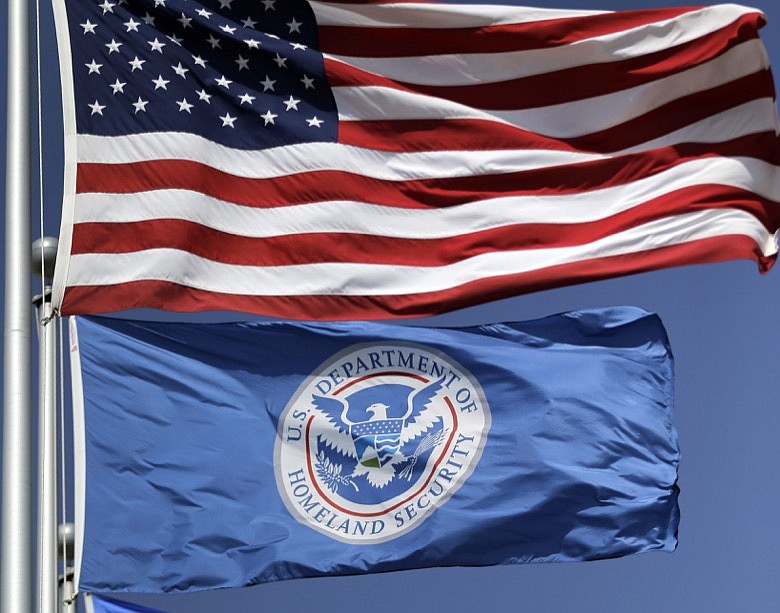ATLANTA -- A congressional committee on Tuesday asked the Homeland Security Department to explain what is being done to prevent violent extremists here and abroad from exploiting the COVID-19 pandemic to terrorize Americans.
The letter from the House Homeland Security Committee, sent to the chief of threat prevention and security policy, comes on the heels of two federal assessments distributed to state and local authorities that radical white extremists were encouraging those infected with the virus to spread it to police and Jewish population centers.
"Extremists have, of course, long made calls to violence against vulnerable groups," the letter states. "However, as the uncertainty, fears, and anxiety engendered by this pandemic strain our social fabric in many ways, we must renew our efforts to guard against vulnerabilities that bad actors may exploit."
The letter also noted the desire by ISIS to leverage European preoccupation with the virus to gain the release of some of their members from prison.
The letter was sent by House Homeland Security Chairman Bennie Thompson, D-Miss., and Rep. Max Rose, D-N.Y., chairman of the Subcommittee on Intelligence & Counterterrorism.
An assessment sent by Federal Protective Service the week of Feb. 17 warned that messages posted in white extremists channels on the messaging app Telegram said it was the "obligation" of infected activists to spread the virus and suggested a variety of methods, including spraying bottled saliva in the faces of law enforcement, spitting on elevator buttons and spending time "in public places with their 'enemies.'"
The FBI's New York field office followed with an alert, first reported by ABC News, that "members of extremist groups are encouraging one another to spread the virus, if contracted, through bodily fluids and personal interactions."
The FBI had no comment on its assessment. A spokeswoman for the Georgia Bureau of Investigation said the agency has received intelligence from the federal government and passed it along to local law enforcement, but she declined to give specifics.
Idle chatter or serious threat?
Experts who monitor extremist groups say it's difficult to know how seriously to take the threat.
"On one hand, it could possibly be looked at possibly as an attempt on humor," said Joshua Fisher-Birch, a researcher with the Counter Extremism Project, which monitors extremist groups in America and internationally.
Fisher-Birch said the posts that attracted the attention of the FBI and Homeland Security are similar to others that predated the pandemic. They encourage action but without a specific plan.
However, he said it is impossible to say if an individual extremist might attempt to carry out the suggestion. This is particularly true among "accelerationist" groups, so called because they look for ways to accelerate the downfall of society in the belief that whites would rebuild a racially pure replacement.
"These are people who have violent intent, especially with accelerationists who are looking at this as an opportunity," Fisher-Birch said.
Mark Pitcavage, a senior research fellow with Anti-Defamation League's Center on Extremism, said the chatter he has seen on far-right racist platforms is just that -- chatter.
"This is not something that we think people necessarily need to be concerned about it, he said."
Pitcavage said reactions to the pandemic by extremist groups have varied, depending on their particular ideology. Accelerationists, who welcome devastating and terrorizing events, are "excited," he said. Reaction among militia groups was more muted, he said.
White supremacist groups, on the other hand, focused more on the origins of the virus, including conspiracies that it was created by Israel, he said.
'Hogwash,' says one extremist
Extremist activists in Georgia dismissed the warnings by the FBI as either fantasy or a hoax perpetrated by federal authorities or planted by left-wing activists.
"I think that is absolutely hogwash," said Michael Weaver, a "pro-white" blogger northwest of Atlanta. "I've been a white nationalist for 26 years. I wouldn't conceive of anything like that. It's despicable."
Weaver said he believes the idea was planted by the FBI, an agency he calls "domestic terrorists." He also has theories on the virus itself.
"I personally think it was created as a biological weapon by the Chinese and they let it get out," he said. "I don't have any evidence. That's just my theory."
Chester Doles, a longtime white supremacist activist in North Georgia, used his profile on the Russian social media platform Vk.com to spread fears of martial law and the suspension of the Second Amendment.
Doles has been a part of a number of far-right groups including the Ku Klux Klan, the National Alliance and other white supremacists groups for decades. In recent months he has moved closer to militia movement and founded a new group called American Patriots USA, which is pushing the Lumpkin County Board of Commissioners to designate the county as a Second Amendment "sanctuary."
Doles said Gov. Brian Kemp's emergency orders have instituted "martial law" and urged the governor to use his executive order to allow the concealing of firearms without a permit so residents can protect themselves.
Doles' concern, like many in the militia movement, is that federal authorities will use the pandemic to restrict gun rights.
